-
 Bitcoin
Bitcoin $84,705.5206
1.96% -
 Ethereum
Ethereum $1,882.8342
2.59% -
 Tether USDt
Tether USDt $0.9999
-0.02% -
 XRP
XRP $2.1020
-0.02% -
 BNB
BNB $603.8511
-0.82% -
 Solana
Solana $124.7702
-1.25% -
 USDC
USDC $0.9999
-0.01% -
 Dogecoin
Dogecoin $0.1717
1.76% -
 Cardano
Cardano $0.6717
0.25% -
 TRON
TRON $0.2380
0.73% -
 Toncoin
Toncoin $3.9856
-3.94% -
 Chainlink
Chainlink $13.7866
0.95% -
 UNUS SED LEO
UNUS SED LEO $9.4087
2.25% -
 Stellar
Stellar $0.2691
1.18% -
 Avalanche
Avalanche $19.3533
1.55% -
 Sui
Sui $2.3689
0.72% -
 Shiba Inu
Shiba Inu $0.0...01244
-1.74% -
 Hedera
Hedera $0.1666
1.40% -
 Polkadot
Polkadot $4.1088
0.73% -
 Litecoin
Litecoin $83.2182
-0.74% -
 MANTRA
MANTRA $6.2222
-1.29% -
 Bitcoin Cash
Bitcoin Cash $306.0723
0.08% -
 Bitget Token
Bitget Token $4.6091
0.13% -
 Dai
Dai $1.0000
0.02% -
 Ethena USDe
Ethena USDe $0.9999
-0.01% -
 Pi
Pi $0.6919
-3.31% -
 Hyperliquid
Hyperliquid $13.1957
-3.08% -
 Monero
Monero $219.3099
1.05% -
 Uniswap
Uniswap $6.1691
2.09% -
 Pepe
Pepe $0.0...07614
3.60%
Bitcoin wallet address creation and security management
Bitcoin wallets store private keys, not Bitcoin; losing these keys means losing your funds, so secure storage is crucial for protecting your cryptocurrency.
Mar 31, 2025 at 10:56 pm
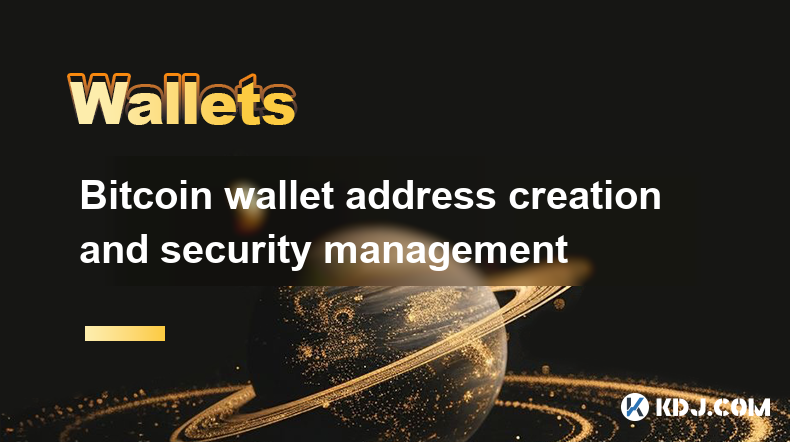
Understanding Bitcoin Wallet Addresses
A Bitcoin wallet doesn't store Bitcoin directly. Instead, it stores private keys which are long strings of characters. These keys grant access to your Bitcoin. Your public key, derived from the private key, is used to generate your Bitcoin wallet address, a unique identifier similar to a bank account number. This address is what you share with others to receive Bitcoin. Losing your private key means losing access to your Bitcoin – there's no recovery. Therefore, securing your private key is paramount.
Creating a Bitcoin Wallet Address: Methods and Considerations
There are several ways to create a Bitcoin wallet address, each with its own security implications.
Using a Software Wallet: Software wallets, like Electrum or Exodus, are downloaded onto your computer or mobile device. They generate a new address each time you receive Bitcoin, enhancing privacy. Security depends heavily on the software's security features and your computer's security.
Using a Hardware Wallet: Hardware wallets, such as Ledger or Trezor, are physical devices that store your private keys offline. They are generally considered the most secure option, as they are not susceptible to malware or online attacks.
Using an Online/Exchange Wallet: Online wallets provided by exchanges like Coinbase or Binance are convenient but expose your funds to the security risks of the exchange itself. Consider the exchange's reputation and security measures before using this method.
Using a Paper Wallet: A paper wallet involves generating your private and public keys offline and printing them on paper. This is a secure method if the paper wallet is stored safely, but it lacks the convenience of other options.
Security Management of Your Bitcoin Wallet Address
Protecting your Bitcoin wallet address and associated private keys is crucial to prevent theft or loss of funds. Here are some key security practices:
Strong Passwords: Use strong, unique passwords for all your wallets and related accounts. Avoid reusing passwords across different platforms. Employ a password manager to help you create and manage complex passwords securely.
Two-Factor Authentication (2FA): Enable 2FA whenever possible. This adds an extra layer of security by requiring a second verification code in addition to your password.
Regular Software Updates: Keep your software wallets and operating systems updated to patch security vulnerabilities.
Antivirus and Firewall: Run a reputable antivirus program and firewall on your computer to protect against malware that could steal your private keys.
Secure Storage of Private Keys: Never share your private keys with anyone. Store them securely, whether in a hardware wallet, a password-protected file, or a well-secured paper wallet. Back up your private keys, but do so securely.
Beware of Phishing Scams: Be cautious of phishing emails or websites that try to trick you into revealing your private keys or login credentials. Never click on suspicious links or enter your information on unverified websites.
Offline Storage for Hardware Wallets: If using a hardware wallet, keep it offline and physically secure to prevent theft or unauthorized access.
Regularly Review Transactions: Check your wallet regularly for any unauthorized transactions. If you detect anything suspicious, take immediate action.
Consider Cold Storage: For long-term storage of significant amounts of Bitcoin, cold storage (offline storage of private keys) is highly recommended.
Multiple Addresses: Use multiple Bitcoin addresses for different purposes. This helps limit the impact of a potential security breach.
Understanding the Risks: Different Wallet Types and Their Vulnerabilities
Each type of wallet carries its own set of risks:
Software Wallets: Vulnerable to malware, computer theft, and operating system vulnerabilities. Regular backups and strong security practices are essential.
Hardware Wallets: Generally considered the most secure, but they can be lost or stolen. Physical security is paramount.
Online/Exchange Wallets: Subject to the security of the exchange itself. Exchange hacks or vulnerabilities can result in the loss of your funds.
Paper Wallets: Vulnerable to physical damage, theft, or loss. Proper storage and backups are critical.
Frequently Asked Questions
Q: What happens if I lose my private key?
A: If you lose your private key, you lose access to your Bitcoin. There is no recovery mechanism.
Q: Are hardware wallets completely secure?
A: While hardware wallets are significantly more secure than software wallets, they are not invulnerable. They can be lost, stolen, or damaged.
Q: How often should I back up my wallet?
A: The frequency of backups depends on your risk tolerance and the amount of Bitcoin you hold. Regular backups, at least weekly or monthly, are recommended.
Q: What is a seed phrase, and why is it important?
A: A seed phrase is a list of words that acts as a master key to your wallet. It allows you to restore your wallet if you lose access to your device or private keys. Keep it safe and secure, as it is essential for recovery.
Q: How can I protect myself from phishing scams?
A: Be wary of unsolicited emails or messages requesting your private keys or login credentials. Always verify the authenticity of websites and emails before entering any sensitive information. Never click on suspicious links.
Q: What is the difference between a public key and a private key?
A: Your public key is like your bank account number; you share it to receive Bitcoin. Your private key is like your bank password; it grants you access to your funds. Never share your private key.
Disclaimer:info@kdj.com
The information provided is not trading advice. kdj.com does not assume any responsibility for any investments made based on the information provided in this article. Cryptocurrencies are highly volatile and it is highly recommended that you invest with caution after thorough research!
If you believe that the content used on this website infringes your copyright, please contact us immediately (info@kdj.com) and we will delete it promptly.
- Santiment Released Data Offering Insights for Spotting Market Dips
- 2025-04-02 11:35:12
- Have You Ever Wondered What It Would Be Like to Invest in the Next Big Meme Coin Before It Skyrockets?
- 2025-04-02 11:35:12
- Circle, the company behind the USDC stablecoin, has filed for an initial public offering and plans to list its shares on the New York Stock Exchange
- 2025-04-02 11:30:12
- Circle, the company behind USDC stablecoin, has filed for an initial public offering and plans to list on the New York Stock Exchange
- 2025-04-02 11:30:12
- Circle, the company behind the USDC stablecoin, has filed for an initial public offering and plans to list on the New York Stock Exchange.
- 2025-04-02 11:25:12
- Hyperliquid's Centralized Twist Exposes the Paradox of Decentralized Finance
- 2025-04-02 11:25:12
Related knowledge
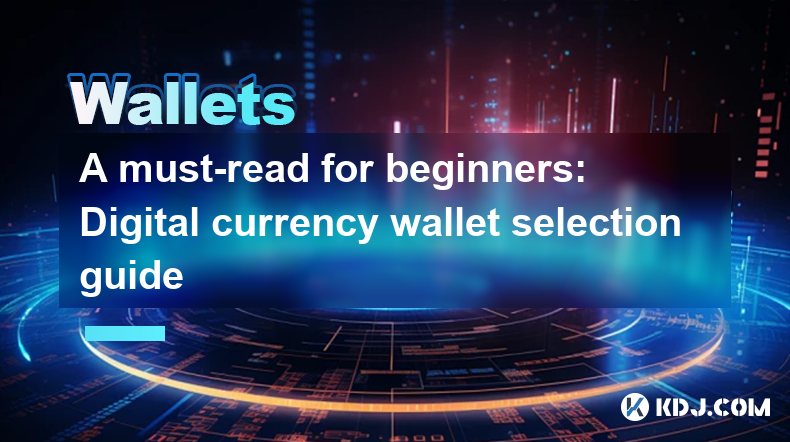
A must-read for beginners: Digital currency wallet selection guide
Apr 02,2025 at 11:49am
Choosing the right digital currency wallet is a crucial step for any beginner entering the world of cryptocurrencies. A wallet not only stores your digital assets but also plays a significant role in the security and management of your investments. With a variety of wallet types available, each offering different features and levels of security, it can ...
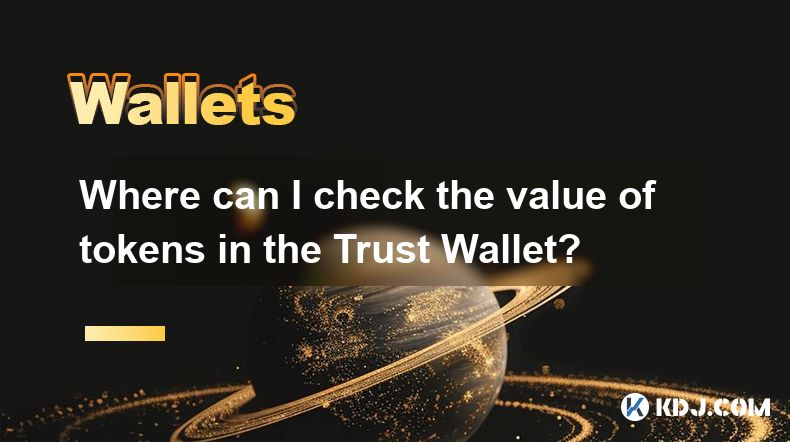
Where can I check the value of tokens in the Trust Wallet?
Apr 02,2025 at 11:14am
When using Trust Wallet, one of the most user-friendly and versatile cryptocurrency wallets available, checking the value of your tokens is a straightforward process. Trust Wallet supports a wide range of cryptocurrencies and tokens, making it a popular choice for both beginners and experienced users in the crypto space. To check the value of your token...
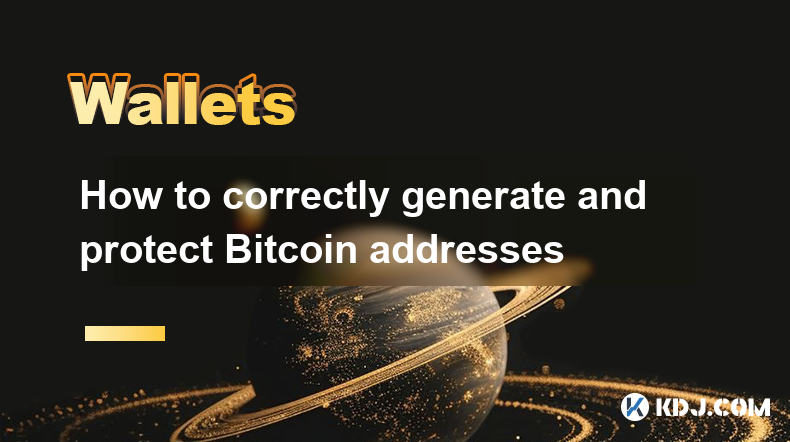
How to correctly generate and protect Bitcoin addresses
Apr 02,2025 at 06:49am
Understanding Bitcoin AddressesA Bitcoin address is like your bank account number. It's a unique identifier that allows others to send you Bitcoin. Unlike a bank account, however, Bitcoin addresses are generated cryptographically and are linked to your private keys. Losing your private keys means losing access to your Bitcoin. Therefore, generating and...

Bitcoin wallet address creation and security management
Mar 31,2025 at 10:56pm
Understanding Bitcoin Wallet AddressesA Bitcoin wallet doesn't store Bitcoin directly. Instead, it stores private keys which are long strings of characters. These keys grant access to your Bitcoin. Your public key, derived from the private key, is used to generate your Bitcoin wallet address, a unique identifier similar to a bank account number. This a...

How to easily generate a Bitcoin payment address
Mar 29,2025 at 10:49am
Generating a Bitcoin payment address might seem daunting, but it's actually quite straightforward. This process is crucial for receiving Bitcoin, as each transaction requires a unique address. Understanding how this works is fundamental to using Bitcoin effectively. This guide will walk you through the simple steps, regardless of your technical experti...
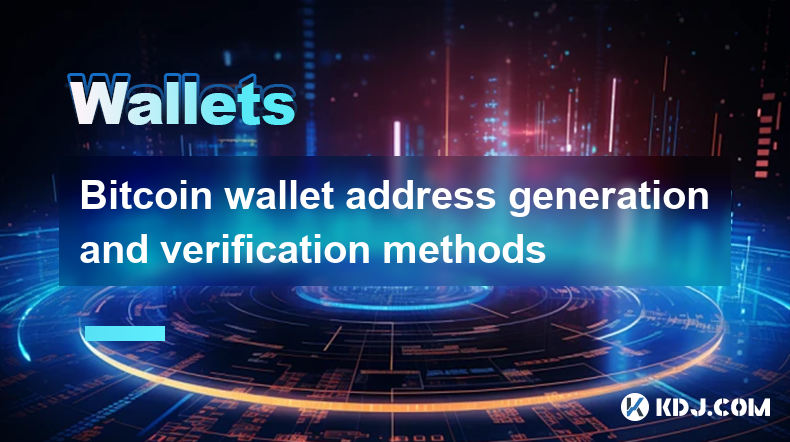
Bitcoin wallet address generation and verification methods
Apr 01,2025 at 11:01am
Understanding Bitcoin Wallet AddressesA Bitcoin wallet address is a unique identifier, similar to a bank account number, used to receive and send Bitcoin. It's a string of alphanumeric characters, crucial for participating in the Bitcoin network. Understanding how these addresses are generated and verified is paramount for secure Bitcoin transactions. ...

A must-read for beginners: Digital currency wallet selection guide
Apr 02,2025 at 11:49am
Choosing the right digital currency wallet is a crucial step for any beginner entering the world of cryptocurrencies. A wallet not only stores your digital assets but also plays a significant role in the security and management of your investments. With a variety of wallet types available, each offering different features and levels of security, it can ...

Where can I check the value of tokens in the Trust Wallet?
Apr 02,2025 at 11:14am
When using Trust Wallet, one of the most user-friendly and versatile cryptocurrency wallets available, checking the value of your tokens is a straightforward process. Trust Wallet supports a wide range of cryptocurrencies and tokens, making it a popular choice for both beginners and experienced users in the crypto space. To check the value of your token...

How to correctly generate and protect Bitcoin addresses
Apr 02,2025 at 06:49am
Understanding Bitcoin AddressesA Bitcoin address is like your bank account number. It's a unique identifier that allows others to send you Bitcoin. Unlike a bank account, however, Bitcoin addresses are generated cryptographically and are linked to your private keys. Losing your private keys means losing access to your Bitcoin. Therefore, generating and...

Bitcoin wallet address creation and security management
Mar 31,2025 at 10:56pm
Understanding Bitcoin Wallet AddressesA Bitcoin wallet doesn't store Bitcoin directly. Instead, it stores private keys which are long strings of characters. These keys grant access to your Bitcoin. Your public key, derived from the private key, is used to generate your Bitcoin wallet address, a unique identifier similar to a bank account number. This a...

How to easily generate a Bitcoin payment address
Mar 29,2025 at 10:49am
Generating a Bitcoin payment address might seem daunting, but it's actually quite straightforward. This process is crucial for receiving Bitcoin, as each transaction requires a unique address. Understanding how this works is fundamental to using Bitcoin effectively. This guide will walk you through the simple steps, regardless of your technical experti...

Bitcoin wallet address generation and verification methods
Apr 01,2025 at 11:01am
Understanding Bitcoin Wallet AddressesA Bitcoin wallet address is a unique identifier, similar to a bank account number, used to receive and send Bitcoin. It's a string of alphanumeric characters, crucial for participating in the Bitcoin network. Understanding how these addresses are generated and verified is paramount for secure Bitcoin transactions. ...
See all articles






















































































